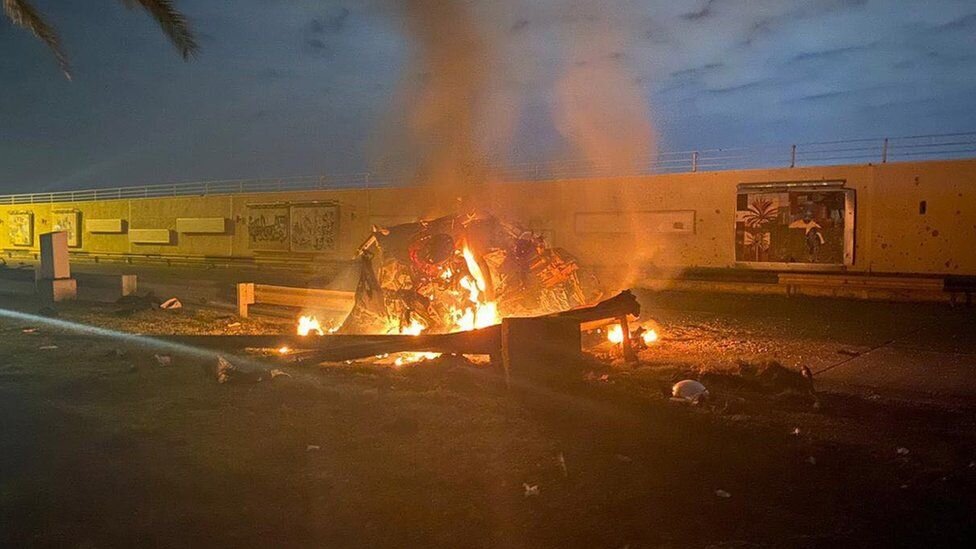Extrajudicial assassination of General Soleimani

TEHRAN - General Soleimani was assassinated on Friday, January 3, 2020, around 1:00 a.m. local time by a United States drone strike near Baghdad International Airport. Donald Trump, the U.S. ex-president, said they had expected an imminent attack by Iran.
The then-Secretary of State Mike Pompeo said Iran was planning actions that threatened U.S. citizens. But it was a huge lie. Article 51 of the Charter of the United Nations prohibits the use of force except under two circumstances; When the U.N. Security Council authorizes the strike and when a country acts in self-defense. If a strike is anticipated but has not yet occurred, self-defense is called anticipatory self-defense, which should be distinguished from preventive self-defense. It seeks to halt a future threat, often in the absence of precise information. As a doctrine, anticipatory self-defense is still in flux. It should be noted that in any case, the occurrence of a military attack is the first condition of legitimate self-defense. A preventive attack, in this case, has no legal value and is not considered a defense, said Eliav Lieblich, associate professor of law at Tel Aviv University. Preventive self-defense is quite unlawful. Kevin Jon Heller, professor of law at the University of Amsterdam, told Al Jazeera that Trump referring to an imminent attack is proof that the United States still needs to offer some legal justification for the attack.
Additionally, it violated the U.N. Convention for the Suppression of Terrorist Bombings 1997, the Convention on the Prevention and Punishment of Crimes against Internationally Protected Persons, including Diplomatic Agents 1973, also Article 21 Convention on Special Missions 1969 with the title Status of the Head of State and persons of high rank, and Article 31 with the title Immunity from jurisdiction. It also Breached the sovereignty of a third State. The two aspects are debatable. These arguments are based on the unproven claims of self-defense and imminent attack and violation of necessity and proportionality. Furthermore, the United States committed limited state terrorism based on its behavior characteristics in this case. The assassination of General Soleimani is a watershed for the rule of law. One aspect of the legal debate concerned the United States' longstanding targeting ban through Executive Order 12,333 issued in 1981. People employed by or acting on behalf of the United States Government are banned from engaging, or conspiring to engage in, assassination. The only available judicial option is, according to the Statute of the International Court of Justice (ICJ) and the International Criminal Court (ICC), the establishment of a Hybrid Court, which is an international court between Iran and Iraq, and the establishment of a fact-finding committee in this regard.
Recalling the agreement between Iraq and the United States in 2008, SOFA (U.S.–Iraq Status of Forces Agreement), the reason for the two-year delay in the formation of such a tribunal is quite understandable. This agreement (Article 4, paragraph 5, and Article 27, paragraph 1) explicitly prohibits the U.S. from using Iraq territory to attack third countries. Therefore, Iraq can consider this action of the United States as a clear example of aggression and violation of the SOFA agreement. It is clear that the United States is violating the jus cogens in international law, the principle of non-use of force, the non-intervention principle, and the right to life. Given the mentioned restrictions and the United States' permanent membership in the Security Council, its presence in the region poses a threat to regional and international peace and security. The Islamic Republic of Iran will always have the right to respond appropriately and take harsh legal retaliation in this systematic and governmental assassination.
Despite accepting the responsibility for the assassination, violating the basic principles and rules of international law, as well as violating its every obligation, The United States has always declared itself a defender of human rights, a guardian of international peace and security. It also justifies all its illegal actions under this gigantic lie. Therefore, the United States withdrawal from the region is a condition for the return of peace and security.
